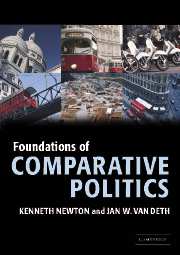Book contents
- Frontmatter
- Contents
- Acknowledgements
- List of briefings
- List of fact files
- List of controversies
- List of tables
- List of figures
- List of abbreviations and acronyms
- Key terms and concepts
- PART I The state: origins and development
- PART II The polity: structures and institutions
- PART III Citizens, elites and interest mediation
- 8 Political attitudes and behaviour
- 9 Pressure groups and social movements
- 10 The mass media
- 11 Voters and elections
- 12 Party government
- PART IV Policies and performance
- Glossary of key terms
- Index of names
- Index of subjects
12 - Party government
- Frontmatter
- Contents
- Acknowledgements
- List of briefings
- List of fact files
- List of controversies
- List of tables
- List of figures
- List of abbreviations and acronyms
- Key terms and concepts
- PART I The state: origins and development
- PART II The polity: structures and institutions
- PART III Citizens, elites and interest mediation
- 8 Political attitudes and behaviour
- 9 Pressure groups and social movements
- 10 The mass media
- 11 Voters and elections
- 12 Party government
- PART IV Policies and performance
- Glossary of key terms
- Index of names
- Index of subjects
Summary
Democratic government is party government: electoral competition is largely party competition; parliamentary politics are invariably party politics; and government is rarely anything but party government. For better or for worse, political parties pervade all aspects of government and politics in democracies. They mediate between citizens, at the bottom of the political system, and parliamentary parties, presidents and prime ministers, at the top, and they span the segments of society (classes, generations, genders, ethnic groups, religions, regions and voluntary organisations). Parties are essential agents that help to structure public opinions, integrate the political system and articulate interests. No wonder that one of the first things new democracies do is form parties, and one of the first things dictators do is ban all parties but their own.
And yet, parties are also widely criticised for being factious and squabbling. The ‘anti-party view’ is that they are the cause of needless conflict and division: since there is ‘only one way to lay a sidewalk’, common sense, and not politics, should guide public affairs. Yet it is precisely because there is no one ‘best way’ of doing things, and because there is almost always disagreement about what to do and how to do it, that we need the faction and conflict of rival parties. Parties formulate and express competing interests and ideas in their unending competition with one another for electoral support.
- Type
- Chapter
- Information
- Foundations of Comparative Politics , pp. 221 - 238Publisher: Cambridge University PressPrint publication year: 2005

